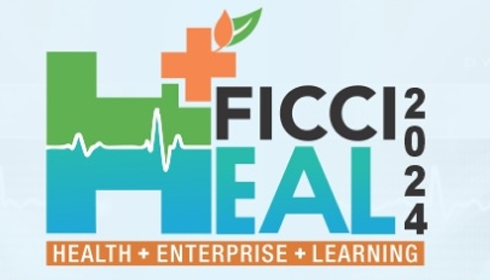
HEAL 2024 Concludes with Visionary Roadmap for a Resilient Indian Healthcare Sector
The two-day ‘FICCI HEAL 2024’ conference concluded yesterday, bringing together healthcare leaders, policymakers, and innovators under the theme ‘Swasth Bharat, Viksit Bharat’ to address and transform India's healthcare landscape. With a strong focus on primary healthcare, cancer care for women, and collaborative healthcare education, the event outlined strategies aimed at achieving a healthier and more resilient India.
Strengthening Primary Healthcare: A Key to Universal Health Coverage
(Hony) Brig Dr. Arvind Lal, Chair of the FICCI Swasth Bharat Task Force and Executive Chairman of Dr Lal PathLabs, emphasized the pivotal role of primary healthcare in universal health coverage. “Primary healthcare is the most important aspect of delivering universal healthcare to the population. By scaling up essential diagnostics through a hub-and-spoke model and leveraging a Lab Information Management System (LIMS), we’ve seen remarkable progress—such as a 300% increase in test volumes and a 220% rise in patient reach at the CHC Sarojini Nagar hub lab,” Dr. Lal noted. With over 70,000 tests conducted since 2021, the initiative marks a significant step toward accessible and sustainable healthcare.
Building Trust and Accountability in Healthcare
Discussions around healthcare governance highlighted the importance of transparency, ethical practices, and trust-building across the healthcare ecosystem. Emphasis was placed on combatting fraud, enhancing regulatory frameworks, and upholding accountability, which are essential for strengthening patient rights and improving healthcare outcomes. Ensuring a culture of ethical practice was identified as a critical measure in bridging trust gaps in healthcare delivery.
Progress in Uttar Pradesh's Primary Healthcare Initiatives
Mr. Partha Sarthi Sen Sharma, Principal Secretary of Health & Family Welfare in Uttar Pradesh, shared insights on the state’s operationalized 21,000-member Ayushman Rapid Response Team (RRT), a transformative primary healthcare initiative. While significant progress has been made, challenges in capacity building, community mobilization, and adapting rural healthcare models to urban settings persist. "Industry collaboration, especially through CSR and self-regulation, coupled with technologies like tele-diagnostics, will be key to advancing healthcare further," Mr. Sharma noted.
Quality Improvement and Innovation in Healthcare
Mr. Rajib Kumar Sen, Senior Adviser at NITI Aayog, underscored the need to shift focus from accessibility to quality improvement. “While progress in accessibility and affordability is commendable, the focus must now shift to improving healthcare quality. The private sector has the potential to drive innovation in predictive technologies and AI to address emerging health issues,” he said. Scalable solutions like telemedicine and diagnostics are critical in overcoming urban healthcare challenges, with private-sector collaboration essential for long-term impact.
Reforming Medical Education for a Stronger Healthcare Workforce
The conference also explored advancements in medical education as a foundation for maintaining high healthcare standards. Dr. Vijay Oza, Acting Chairman of the National Medical Commission (NMC), outlined recent regulatory reforms aimed at better preparing medical professionals. “The NMC has introduced significant reforms to better prepare medical professionals for the future. By defining qualifications more clearly, introducing specialized postdoctoral fellowships, and ensuring high educational standards, we are equipping graduates and postgraduates with the skills needed to tackle future healthcare challenges,” Dr. Oza explained.
Digital Health and Innovation: Driving the Future of Patient Care
Dr. Suchita Markan, Scientist and Mission In-charge at ICMR, highlighted the impact of digital health innovations on patient care and healthcare delivery. “Our goal is to connect innovators with growth opportunities and strategic partnerships to advance accessible, high-quality healthcare,” she remarked, emphasizing digital health's critical role in elevating patient care standards.
A Transformative Platform for India's Healthcare Vision
As India’s premier healthcare forum, FICCI HEAL 2024 reaffirmed its commitment to uniting healthcare stakeholders and driving sustainable reforms under the ‘Swasth Bharat, Viksit Bharat’ vision. The conference served as a dynamic platform for fostering meaningful change, setting a clear path to uplift the quality of life for all Indian citizens through transformative healthcare strategies.